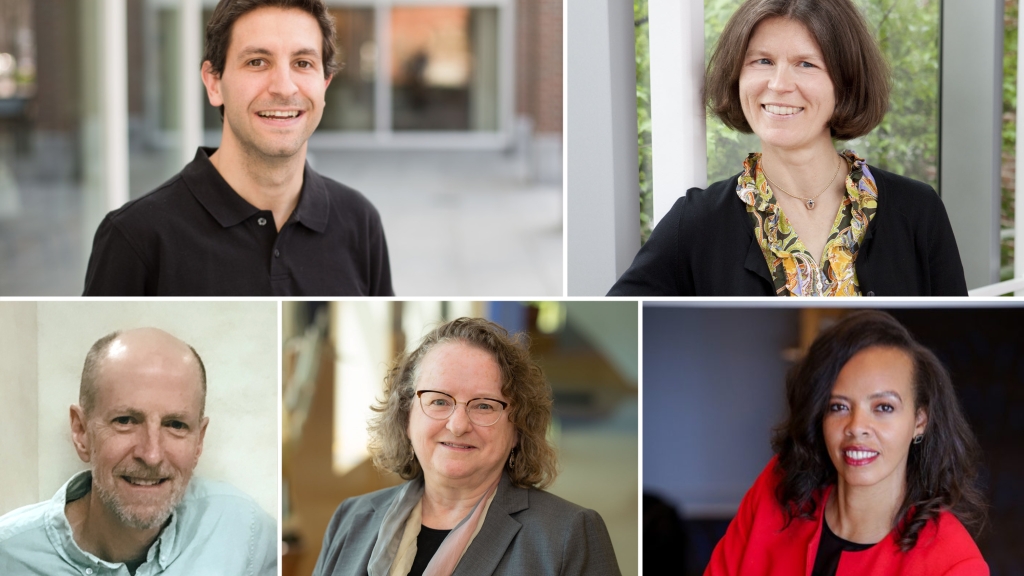Five faculty leaders have been selected for the inaugural class of Ivy+ Faculty Advancement Network Leadership Fellows. The network includes 12 national research universities that collaborate to advance diversity, equity, inclusion, and belonging in the American professoriate.
The 2022-2023 Ivy+ fellows will take part in the FAN Institute on Inquiry, Equity and Leadership in the Academic Department. The institute brings together faculty members from the Ivies and similar universities for workshops on subjects such as equity-minded leadership, searches and hiring, and culture and climate.
"The Ivy+ Faculty Advancement Network is dedicated to addressing the most pressing needs in response to advancing diversity and equity in higher education," says Senior Vice President and Senior Diversity Officer Shontay Delalue, who is a co-chair of FAN.
"A FAN landscape analysis identified the need to provide academic chairs and deans with tools that would enhance their ability to lead with an equity-minded lens," Delalue says. "The institute model with campus-based cohorts as well as engagement across Ivy+ institutions is a great way to support leaders and allow for the cultivation of the most innovative ideas that can further advance diversity, equity, and inclusion on our campuses."
The leadership fellows were nominated by their deans and selected based on their commitment to inclusive and equitable leadership, says Associate Provost for Faculty Affairs Dean Lacy, who serves on FAN's executive and steering committees. This year's focus is on STEM fields.
Dartmouth's fellows are Petra Bonfert-Taylor, Thayer School of Engineering associate dean for diversity and inclusion; Erika Brown, Geisel School of Medicine dean of faculty affairs; Sergi Elizalde, chair of the Department of Mathematics; Marnie Halpern, chair of the Department of Molecular and Systems Biology; and Thomas Jack, chair of the Department of Biological Sciences.
They join 40 department chairs, deans, and other senior administrators from Columbia, Cornell, Duke, the Massachusetts Institute of Technology, Princeton, Stanford, the University of Chicago, the University of Pennsylvania, and Yale.
‘The Most Important Leadership'
The fellowship kicked off earlier this fall with a retreat at Yale, where participants explored the fundamentals of equity-minded leadership for faculty leaders. Upcoming workshops will serve as inquiries into opportunities faculty leaders can access to increase inclusivity within their departments. At their final meeting, in April, the fellows will design interventions for creating systemic improvements in diversity and inclusion in American college and university faculties.
Lacy says the fellowship's goals include building a cohort of department-level leaders and deans who are committed to equitable leadership practices and can share ideas within their schools and with partner institutions.
While presidents, provosts, and deans can set the tone and define goals, "the most important leadership for advancing diversity, equity, and inclusion, and for healthy departments, is at the department level," he says. The Ivy+ Faculty Advancement Network serves as a conduit, bringing together people from similar departments to identify "challenges that might be unique to their own disciplines."
As Ivy+ fellows, Bonfert-Taylor, Brown, Elizalde, Halpern, and Jack will meet with senior leadership to discuss their suggestions for helping Dartmouth advance its equity goals, Lacy says. They also will work with Lacy, Delalue, and other senior leaders on ideas to pitch to Dartmouth leadership this winter and spring.
Some of Dartmouth's Ivy+ fellows shared their thoughts about the program.
Petra Bonfert-Taylor
Dartmouth Engineering's mission is to build a school that embodies openness, accessibility, collaboration, and human-centered innovation, and work toward becoming a community that puts equity and inclusion at the core of our scholarship, teaching, and practice.
I am excited to be a part of the Ivy+ Faculty Advancement Network Leadership Institute, which will allow me to further develop equity-minded and forward-thinking leadership strategies to advance this mission. I am equally excited to connect with other Dartmouth and Ivy+ fellows to leverage our collective expertise and collaborate on interventions in our united goal to advance equity at our institutions. Through this opportunity, I hope to gain strategic insight and skills to strengthen Thayer's efforts to elevate historically marginalized voices at Dartmouth and work toward becoming a community that comes together across differences as we respond to evolving challenges in our world.
Sergi Elizalde
The Ivy+ Faculty Advancement Network provides a great resource for learning a lot of the skills necessary for being a department chair. The fellowship consists of a series of workshops throughout the year that focus on topics like equity-minded leadership, advancing faculty diversity, and best practices for recruiting and assigning committee work.
One of my hopes for this program is to become part of a network of science department chairs and deans at other Ivy+ institutions, learn about how they do things, how they have dealt with situations similar to the ones I'm experiencing, and generally be able to brainstorm and get advice.
Marnie Halpern
I am looking forward to learning from expert speakers and colleagues from other schools on best practices for ensuring a welcoming and equitable environment for recruiting and retaining faculty from diverse backgrounds to the Department of Molecular and Systems Biology at Geisel. As a research scientist, I am acutely aware of the need for a more inclusive workforce in the biomedical sciences and intend to work with the Dartmouth team to develop new strategies toward achieving this goal. I feel that there is a renewed awareness and commitment from MSB faculty members as well as strong support from new leaders at Dartmouth.
